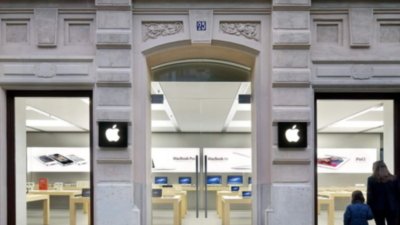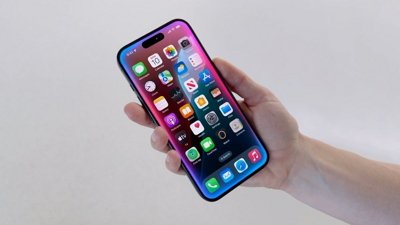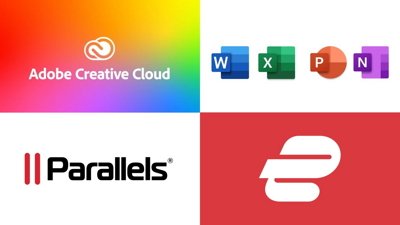Civil liberties group Electronic Frontier Foundation on Thursday awarded Apple a "gold star" in recognition of its efforts to "fight for user privacy in Congress" by joining the group. Cloud-based storage provider Dropbox also received a star for joining the coalition.
The aim of the Digital Due Process group is to "simplify, clarify, and unify the ECPA [Electronic Communications Privacy Act] standards, providing stronger privacy protections for communications and associated data in response to changes in technology and new services and usage patterns, while preserving the legal tools necessary for government agencies to enforce the laws, respond to emergency circumstances and protect the public."
The ECPA was enacted in 1986 in an effort to establish restrictions for law enforcement with respect to electronic communications. According to the coalition, the law has not undergone a "significant revision" in its 25 years of existence. The group argues that today's digital communication services, which have undergone significant technological advances since 1986, are not being adequately protected by the ECPA.
Digital Due Process specifically highlights email, mobile location, cloud computing and social networking as new technologies that need to be included in the law. The group also argues that the ECPA in its current form suffers from conflicting standards and illogical distinctions, unclear standards, judicial criticisms and constitutional uncertainty.
Other prominent members of the coalition include Amazon, AT&T, Google, Intel and Microsoft.
Apple may have a special interest in protecting user privacy for mobile location. Earlier this year, security researchers claimed to have discovered that Apple was tracking users' locations in its iOS 4 mobile operating system. The iPhone maker responded to the controversy by denying that it had tracked users and asserting that it had instead maintained a crowd-sourced database of Wi-Fi hotspots and cell phone towers.
In spite of its claims, Apple has been the target of several law suits and government investigations as a result. The South Korean Communications Commission fined Apple $2,830 in August, while a group of 27,000 residents of the country have filed a class-action lawsuit seeking $26 million in damages for privacy violations.
The Cupertino, Calif., company may also be interested in pushing for reforms that would protect cloud computing users' privacy rights as it readies the launch of its iCloud service this fall. Given that Apple is planning on widespread adoption of its new cloud computing initiative, the company is assumedly looking to avoid any privacy-related controversies that could spook users.
Earlier this year, Apple announced that it will deprecate application access to "uniqueIdentifier," also known as UDID. The company is facing lawsuits over the UDID issue, with users complaining that their privacy has been violated.
During a Senate hearing in May, Apple Vice President of Software Technology Bud Tribble highlighted the company's commitment to customer privacy. "Apple is strongly committed to giving our customers clear and transparent notice, choice and control over their information, and we believe our products do so in a simple and elegant way," he said.
 Josh Ong
Josh Ong














 Christine McKee
Christine McKee
 Stephen Silver
Stephen Silver

 Charles Martin
Charles Martin


 Amber Neely
Amber Neely









14 Comments
Maybe these companies mean well, but I'm sure someone is paying someone to keep loopholes open. Not buying Google's part of it. Companies will always want to have an eye on users and data. And the more cash they have the more data they can get.
I?m glad Apple et al are taking a stand. I?m not interested in managing a personal information economy. I can?t be the only person to think it?s unfair when software developers to demand personal information as payment when it is clearly not necessary to deliver the service.
Sure you can exercise your right not to sign up to such a service, but inevitably enough sheeple will sign up, making the business model viable and creating a barrier to other companies from entering the market and offering a more ethical service.
Apple obviously has an interest in this: its chief rival's business is invading others' privacy. But it's still encouraging.
Other prominent members of the coalition include Amazon, AT&T, Google, Intel and Microsoft.
It's great that Google joined the coalition. They need to change their attitude though.
The best thing that would happen is for Facebook to open up its data. Failing that, there are other ways to get that information.
We don’t need you to type at all. We know where you are. We know where you’ve been. We can more or less know what you’re thinking about.
Defending Google’s Street View service on CNN’s “Parker Spitzer” program in October, Schmidt said that people who don’t like Street View cars taking pictures of their homes and businesses “can just move” afterward to protect their privacy. Ironically, Schmidt said this on the very day that Google conceded that those cars did collect more than just fragments of personal payload data.
There is what I call the creepy line. The Google policy on a lot of things is to get right up to the creepy line and not cross it.
I don't think this is about what private companies are allowed to do, it's about what law enforcement is allowed to do.